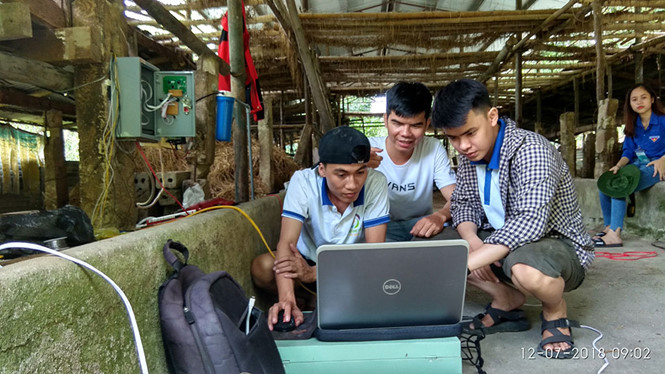Students offer farmers a helping hand
06/09/2018 11:14

Võ Thái Tuyễn, left and other members from Đà Nẵng University of Science and Technology working at a horse stable.
Thousands of students across the country have been taking part in volunteer campaigns aimed at promoting the important role of youth in contributing to the country’s cultural, social and economic development.
But for one group of young volunteers from Đà Nẵng University of Science and Technology, this summer was that little bit more special as they have chance to offer training in advanced farming techniques.
Amid the scorching summer heat of summer in central Việt Nam, spending all day working in a stable amid the stench of manure and rubbish is not everyone’s idea of a holiday.
But that’s exactly what these students did, for weeks at a time to help local farmers.
Topics included the trùn quế or perionyx excavates, a tropical worm species that causes problems to the animals.
Nguyễn Thị Thùy Dương, the group leader, said there were five people taking part from different faculties including environmental engineering, mechanical engineering and electronic and telecommunication engineering.
But they all shared one common goal, a passion for clean and green agriculture.
The project’s target was limiting the environmental pollution from agricultural waste to the minimum level using this to raise income.
The project has helped the students achieve the first prize in a competition on start-up initiatives in central region.
According to Dương, agriculture is the main source of income for the people in many rural areas, however, along with the increase in livestock herds and small scale farming models in the residential areas, waste management has not been strictly controlled.
As a result, discharged waste seriously affects the environment, quality of life and health of the people.
In the meantime, the application of perionyx excavates for treatment of husbandry waste faced difficulties and is time-consuming, and often fails to produce the desired effect, especially to small-scale farming households in residential areas.
To carry out the project, the group has conducted surveys and experiments in Hòa Vang District’s Hòa Bắc Commune where 85 per cent of population works in agriculture.
Starting in October last year, the team conducted fieldwork in certain areas and handed out questionnaires.
The new system was completed after five months of implementation, she said.
“Numerous difficulties were recorded during the process and we have to do it again and again,” Dương told Đà Nẵng online newspaper.
Another challenge was there was no place for manufacturing and testing the system but the problem was solved it with the help of Lê Thị Xuân Thùy and Lê Hoài Nam, their lecturers at the university, she said.
Now the new system has proved its economic efficiency compared with the normal one from a local household. Specifically, the number of worm castings with system produced by the group could triple past results.
According to Võ Thái Tuyễn, another group member, perionyx removes a very nutritious feed for animals, helping them grow quickly and enhance their resistance while worm castings are a rich organic source with lots of nutrients and moisture-holding capabilities, enriching soil condition.
“Automatic worm raising system can continuously update the temperature, humidity and automatic spray water when it is necessary,” Tuyễn said.
In addition, breeders could operate the system via smartphone or computer, he said, adding that farmers were only busy at the feeding and harvesting time.
Lê Ngọc Anh, a breeder from Hòa Bắc Commune received the support from the students. He believes the technology would be soon expanded to other farming households in the area.
“Only by applying advanced science and technology, can farmers save their labour force and improve the productivity,” he told the Thanh Niên (Young people) newspaper.